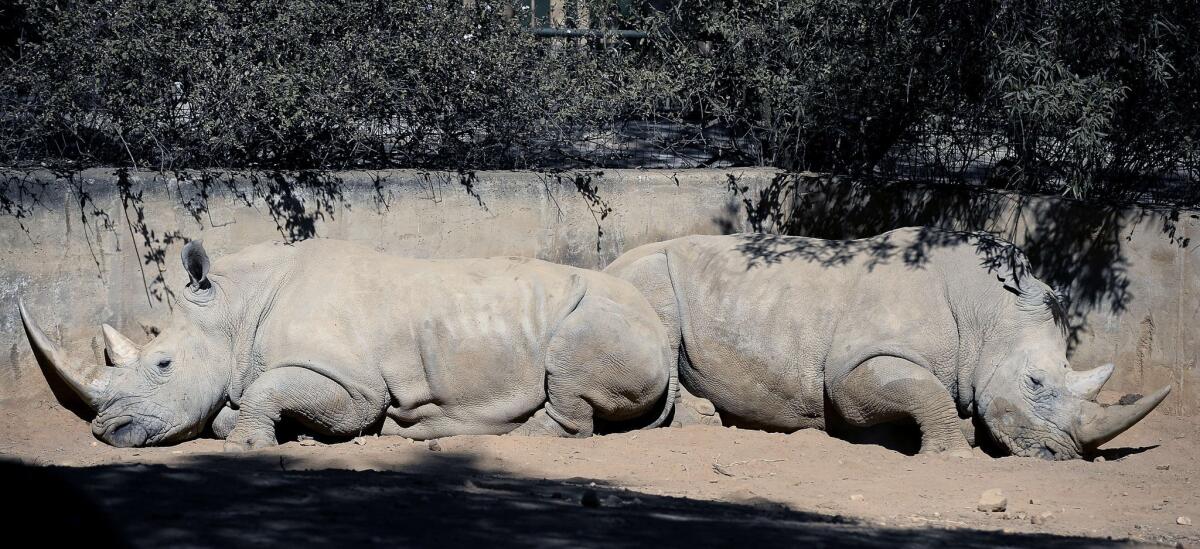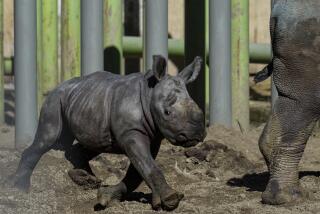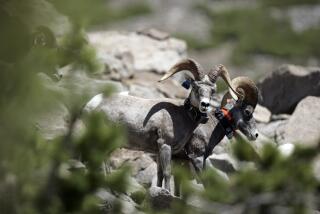How to save the rhino, according to South Africa

- Share via
JOHANNESBURG, South Africa -- Efforts to save the rhinoceros in South Africa are failing, according to a report to the government by an independent expert.
The report called for radical solutions: drones to track rhino poachers; de-horning of all South African rhinos; rhino farms; and legal trade in stockpiled and farmed rhino horn that could be auctioned or traded through a South African-based bourse.
Since the beginning of the year, more than 500 rhinos in the country have been killed, compared with 668 for the whole of last year. That leaves about 20,000 rhinos in South Africa, which account for 90% of the continent’s rhinos.
The poaching statistics tell the story of an accelerating killing rampage: 2007, 13 poached; 2008, 83; 2009, 122; 2010, 333; 2011, 448; 2012, 668, and 515 so far this year, suggesting the number of rhino illegally killed this year could top 900.
In his report to the government, Mavuso Msimang, appointed rhino issue manager last year to research solutions to the crisis, called for an end to the ban on rhino horn trade and farming, arguing that the objective -- quelling demand for horn in Asian markets -- had not worked.
Msimang’s report called for the usual improvements in security: more rangers, better equipment, and improved border security between South Africa and Mozambique to prevent horn smuggling through the neighboring country and poachers coming in from Mozambique to kill rhinos. But even if these were implemented, he argued, it wouldn’t save the rhino.
“As long as there is demand for rhino horn, effective means of supplying it must be developed that would have the effect of saving the wild rhino as a species,” the report argues. “The data suggest that the banning of legal open trade in rhino horn has not resulted in reduced demand for the horn and has thus not helped the objective of saving the rhino from imminent extinction. Escalation in the slaughter of rhino is proof of this. Consumers simply do not believe that rhino horn has no medicinal value.”
Trade in rhino horn is banned under the Convention on International Trade in Endangered Species of Wild Fauna and Flora, which next meets in South Africa in 2016. Trade in horns cannot go ahead unless the organization relaxes the ban.
South African efforts to combat poaching are complicated by the enormous distances rangers have to cover in state-owned Kruger Park, where most of the rhinos are being shot, and by the well-armed, well-equipped syndicates who invade the 7,580-square-mile park with night-vision goggles and high-caliber weapons. Of the rhinos killed this year, 321 were shot in Kruger Park.
South Africa’s corruption also has undermined enforcement. Rangers have been implicated in poaching and rhino horn trafficking, while seized horns have disappeared from police stations. Another factor in the rise in poaching is the poverty of communities that live around Kruger Park and other wildlife parks, easy fodder for the poaching syndicates.
This month the government floated a plan to flood the market with horns by selling off its nearly 20-ton stockpile accumulated over the years from animals that died naturally, hoping to drive prices down and put poaching syndicates out of business.
Other measures tried in South Africa include dosing horns with a toxic substance to destroy their market value, deploying the army in Kruger Park and signing agreements with the Vietnamese government, one of the major sources of demand.
But still the killing goes on.
Traffic, the international nonprofit organization combating wildlife trafficking, recently developed television advertisements for Vietnam, designed to discourage rhino horn demand and combat myths and rumors that the substance can cure cancer.
The group says poaching levels are at their highest in 20 years.
Critics of the South African government’s efforts to open up the rhino horn trade argue that there’s no evidence it will reduce demand. They also argue that government is unlikely to successfully control legal sales, because of the high level of corruption.
“Illegal trade alone is nudging rhinos to extinction,” Kelvin Alie, director of the International Fund for Animal Welfare’s Wildlife Crime and Consumer Awareness Program, said in a statement. “Selling stockpiled horn might make financial sense in the short-term, but is naive economic simplicity when one considers biological and animal welfare consequences.
“The South African government needs to think very carefully about the implications of their plans,” Alie said.
He said the answer to illegal wildlife trafficking was international cooperation between law enforcement authorities.
ALSO:
Pope Francis visits a tough Brazilian slum
Red tape bars students from top China schools
Militants in Egypt’s Sinai Peninsula grow stronger
More to Read
Sign up for Essential California
The most important California stories and recommendations in your inbox every morning.
You may occasionally receive promotional content from the Los Angeles Times.










